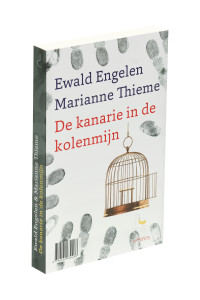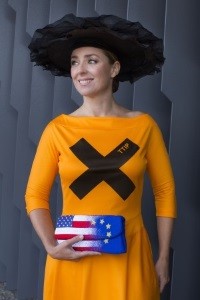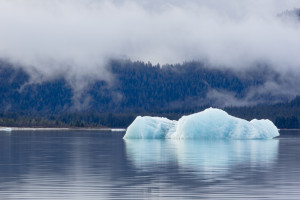Worldlog 18 de abril 2016
El domingo, 10 de abril era ya el 22 Congreso de nuestro partido. Más de 400 miembros asistieron a este día inspirador. Cada conferencia que pasa me parece especial ver personas con una diversidad de orígenes que comparten los ideales de nuestro partido. Además de los elementos habituales, tales como el informe anual y la cuenta financiera anual, el profesor Ewald Engelen dio una conferencia acerca de sus puntos de vista sobre la crisis bancaria. Comparó el sistema financiero totalmente podrido con la forma en que esta organizado el subasto de alimentos de alimentos con sus numerosos escándalos alimentarios como el fraude de la carne de caballo. También contó como cambio de un fanatico carnívoro se convirtió finalmente en vegetariano. Junto con Ewald escribi el nuevo libro “El Canario en la Mina de Carbón“.

En el Canario en la Mina de Carbón se juntan nuestros puntos de vista sobre economía y ecología. Nuestro libro sale en esta semana en los Países Bajos. Especialmente para los interesados internacionales también saldra una versión en Inglés en la forma de un E-book (libro electrónico). Lo esperamos para principios de mayo y los mantendremos informados!
En mis anteriores Worldlogs les conte sobre el referéndum celebrado en los Países Bajos el 6 de abril, el mismo que permitio a los holandeses expresarse en favor o en contra del tratado de libre comercio entre la UE y Ucrania. Con mi partido hice campana en contra del tratado y me alegro de que la mayoría de la gente también votó en contra. Creo que nuestro gobierno, que esta en favor, no puede pasar por alto de los resultados finales. La semana pasada hubo un debate en el Parlamento donde indique una vez más que un ‘no’del pueblo holandes tendra que significar ‘no’ literalmente por lo que el tratado no podra ser ratificado.
Anteriormente también insisti en nuestro gobierno a organizar un referéndum sobre TTIP. En ese entonces rechazaron mi solicitud. El resultado del referendum sobre un tratado de libre comercio con Ucrania deja ver que la mayoría de los votantes se muestran críticos de los acuerdos de libre comercio. Por lo tanto, una vez más, he presentado una propuesta de referéndum sobre la conveniencia de TTIP. En la semana del 25 de abril se votara sobre la misma.

“¿De qué sirve el dinero si el hielo se derrite?” Ese era el título de mi discurso la semana pasada en el debate sobre el Ártico. Queremos que el gobierno se comprometa a plenas para la protección del Polo Norte. El gobierno holandés si lucha por una proteccion optima del Polo Sur, pero en cuanto al Polo Norte parece ser que la se coloca la ganancia economica sobre la delicada naturaleza y el medio ambiente.
Porque a pesar de que lel Parlamento en 2014 paro una moción de mí en 2014 para proteger el petróleo del Ártico y el gas, el gobierno ahora parece centrarse en el desarrollo de oportunidades económicas en el Ártico. El gobierno incluso quiere representar activamente a los intereses de las empresas holandesas que pueden ganar dinero con la extracción de petróleo y gas que se pueden encontrar en el Ártico ahora con el calentamiento del Polo Norte.

El gobierno quiere proteger a todo lo bello, prístino y significativa a menos que haya dinero entremedio. El gobierno debe poner prioridad en la preservación del Ártico y de todo el planeta de un mayor calentamiento y la contaminación. No hay ningún otro interés que podrían pesar más.
Esto fue todo por ahora, hasta la proxima vez!
Un saludo cordial,
Marianne
On Sunday the 10th of April, we celebrated our Party´s already 22th congress. More than 400 members were present on this inspiring day. Every congress it is remarkable to see people of so many different backgrounds sharing our party’s ideals. In addition to the customary items such as an annual report and annual financial accounts, Professor of Financial Geography Ewald Engelen gave a guest lecture on his views of the banking crisis. He compared the thoroughly rotten financial system to the way our food supply, with its many food scandals including the horse meat fraud, is organised. He also talked about how he had shifted from being a confirmed meat-eater to being a vegetarian. Together, Ewald and I have written our new book De Kanarie in de Kolenmijn (The Canary in the Coal-mine).

In De Kanarie in de Kolenmijn, our visions on economics and ecology meet. As of this week, our book will be sold in the Netherlands. An English version in the form of an e-book will also be published specially for our international readers. This e-book is expected to come out in the beginning of May, so I will keep you informed!
In my last Worldlogs, I have written about the referendum that was held in the Netherlands on 6 April. With this referendum, the Dutch people were able to indicate whether they were in favour of or against the trade agreement between the EU and Ukraine. Together with our party members, I have campaigned strongly against this agreement and I am therefore glad that a majority of the Dutch citizens has also voted against. I think that our government, which is in favour of the treaty, may definitely not ignore the result of this vote. Last week, during a debate in the Lower House, I have indicated once again that a no vote by the Dutch people should literally mean no, and the treaty should therefore not be ratified.
Earlier I have urged our government to hold a referendum on TTIP, but my request was denied. The result of the referendum on the EU/Ukraine treaty shows us that a majority of our voters are critical of free trade agreements. That is why I have once again tabled a motion for a referendum on the desirability of TTIP. It will be put to the vote during the week of 25 April.

“What good will money do you when the icecaps are melting?” That was the title of my contribution to the debate on the Arctic Region last week. We want to see the government fully commit itself to the protection of the North Pole. The Dutch government is fighting for optimum protection of the South Pole, but when it comes to the North Pole, economic gain seems to be put above the fragile wildlife and environment.
After all, despite the fact that the Lower House carried my motion of 2014 on safeguarding the Arctic Region against oil and gas extraction, the government still seems to be focusing on developing economic opportunities in the Arctic. The government is even planning on taking an active role in looking after the interests of Dutch companies that will make money from oil and gas drilling, which has now become possible due to the warming of the North Pole.

The government is willing to protect all that is beautiful, unspoiled and meaningful, expect when there is money in the ground. The government should make the protection of the Arctic Region and the entire planet against further warming and pollution its priority. No other interest can be of more importance.
That’s it for now, until next week!
Kind regards,
Marianne